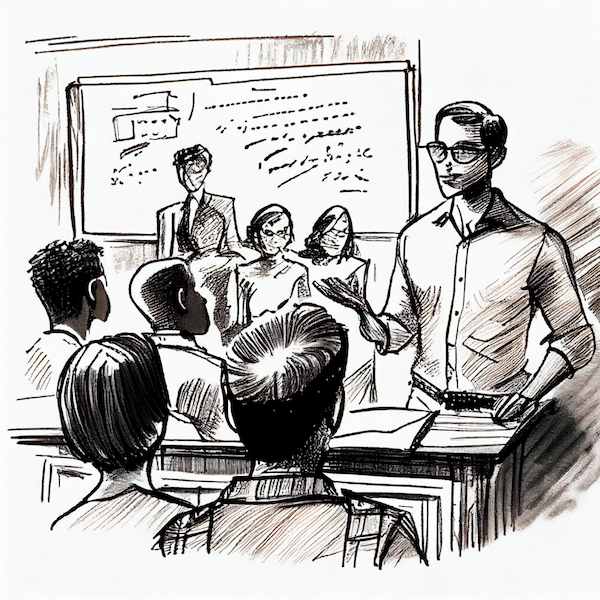Teaching Statement 2023

Facilitating and Inspiring Students’ Learning
My teaching philosophy is shaped by two primary principles: situation and iteration.
First, I facilitate students’ learning by situating instruction, assignments, and assessments within the social context of the class—a community of practice. I create space for this social context through course meetings, online discussion forums, asynchronous video discussions through Flip, and verbal feedback on written work through VoiceThread. Because graduate students are also situated within professional contexts, whether work contexts for M.S. and Ed.D. students or scholarly contexts for Ph.D. students, I emphasize the importance of connecting class discussions and assignments to their professional interests. Each semester, I tell students that if an assignment does not matter to their professional situation, they should let me know, and we will determine an alternative assignment that would be meaningful as they tackle real problems and opportunities in their professional roles.
Second, I inspire students’ learning through iteration. I emphasize formative assessments by giving feedback that is timely, thorough, and kind. I give feedback through various modalities, including overall notes, comments in documents, video chats, and screencast recordings. In addition, I facilitate multidirectional feedback in the form of self-reflection and peer review. Students can revise any assignment based on feedback, and I will adjust their grades accordingly. I emphasize that this process is not linear, but cyclical and responsive: students complete work and can then revisit and improve. In this process, I affirm and strengthen students’ agency by inviting them to co-create their learning experiences, helping them self-reflect, and guiding them toward asking better questions.
Unique Approaches to Teaching
In acknowledgment of the lives graduate students lead outside of school, I organize all my content into two-week modules so that assignments are only every due every other week—this provides some flexibility for when students can complete their work. The first week of a module includes space for me to introduce the new topic and time for students to complete readings. In addition, I assign optional resources that students can explore to the degree to which they are interested. These supplemental resources include podcasts, public datasets and code, websites, interactive web apps, and videos. In my Learning & Web Analytics class, I create onramps to new topics by sharing “data stories,” or current events from the news or social media that are immediately applicable to course objectives. In most cases, these data stories lead into conversations of ethical considerations raised by big data in education. I also give demonstrations of computer programming in R for collecting real educational data from social media or learning management systems and analyzing these data with methods such as social network analysis and natural language processing. As a class, we document various technologies and resources useful for analytics on a shared Padlet website where anyone in the class can contribute. In the second week of a module, then, students have space to focus on digging deeper into topics through discussions and completing assignments, where I respond and give feedback, and students can revise and resubmit as needed.
Continued Improvement
In 2022, I went through training and received certifications in Online Quality Review and Applying the Quality Matters Rubric. With these certifications, I significantly updated one course and fully redesigned another so they would achieve Quality Matters—High Quality ratings through external review from three QM expert faculty outside FSU. QM training, redesign, and external reviews are some of the most significant professional development steps available for improving online teaching. Finally, each term I seek feedback through a mid-semester student survey and adjust my teaching accordingly.